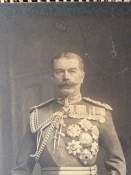[Attributed to Carl VANDYK[E] (17 January 1851 - 18 November 1931)]
A signed photograph of Field Marshal Lord Kitchener, of Khartoum (1850-1916).
Large sepia-toned photograph (11 3/8 x 7 ¾ inches ) on original card mount (11 7/8 x 7 ¾ inches), signed lower right in brown ink by Kitchener.
Condition: light surface damage (see images), mount with rounded corners (see images).
An original signed photograph of Field Marshal Horatio Herbert Kitchener, 1st Earl Kitchener of Khartoum.
According to the Imperial War Museum this portrait is by the London photographer Vandyk [or Vandyke]: "Full length portrait of Field Marshal Earl Kitchener of Khartoum, in full dress uniform and carrying his Field Marshal's Baton, taken shortly after being promoted to the rank and before his appointment as British Governor General of Egypt and the Sudan." (http://www.iwm.org.uk/collections/item/object/205022638)
"After serving as a volunteer with a French ambulance in the Franco-Prussian War (1870-1871), Kitchener (1850-1916) was commissioned into the Royal Engineers in 1871. Following survey work in Cyprus and Palestine, he was promoted to captain and attached to the Egyptian army. During the failed Nile expedition of 1884 he served as an aide de camp and was then commandant at Suakin (1886-1988). Kitchener was wounded at Handub in January 1888, commanded a brigade from 1889 until 1892 and was then made Sirdar (commander-in-chief) of the Egyptian army.
Promoted to major-general in 1896, Kitchener became a household name during the conquest of the Sudan. He built a railway to ensure logistical support and used river steamers to move his Anglo-Egyptian army down the Nile. On 2 September 1898 he defeated the Dervishes at Omdurman. Rewarded with a peerage, in 1900 Kitchener was made lieutenant-general and posted to South Africa as Lord Roberts' chief of staff, where his organisational talents and energy did much to reverse the course of the Boer War (1899-1902) and ensure British victory. However, whereas Roberts' heroic image remained unsullied at the end of the war; blame for its darker aspects, including the use of concentration camps, fell on Kitchener.
Kitchener was appointed Commander-in-Chief in India in 1902 and reorganised the Indian Army, merging the three Presidency armies into a unified force that had enough troops for internal security needs alongside a striking force of nine divisions and five cavalry brigades. During this period Kitchener clashed with the Viceroy Lord Curzon who resigned his position. Promoted to field marshal in 1909, Kitchener then turned his attention to reforming the colonial and dominion forces.
In 1911 he was made British agent in Egypt and embarked on a programme of reforms that did much to improve the country. Although he possessed great organisational skills and was a successful colonial campaigner, Kitchener found it difficult to delegate, or work as part of a team, and his austere demeanour did nothing to advance his personal popularity with those who served alongside him.
With retirement beckoning, he was appointed Secretary of State for War in August 1914. While many expected the war to be 'over by Christmas', Kitchener realised it would be long and on an unprecedented scale. He appealed for volunteers for his 'New Armies' and was immortalised on Alfred Leete's 'Your Country Needs You' poster. For the next year and a half he virtually ran the war effort, providing the nation with an army capable of meeting its continental commitment. However, like most of his contemporaries Kitchener failed to understand the realities of modern industrialised warfare. His influence declined in the aftermath of the 1915 'shell crisis' and the failed Dardanelles expedition, an operation he had campaigned for in cabinet. Dispatched to Russia on a fact-finding mission, Kitchener drowned on 5 June 1916 when his ship struck a mine off Orkney." (National Army Museum)
- Overall Condition: Acceptable
- Size: 11 7/8 x 7 ¾in; 300 x 223mm
- Sold By: Shadowrock Rare Books
- Contact Person: Adam Langlands
- Country: United States
- Email: [email protected]
- Telephone: 001-860-248-1547
- Preferred Payment Methods: Paypal, US$ checks and wire transfers, major credit cards through paypal
- Trade Associations: AA Approved




























